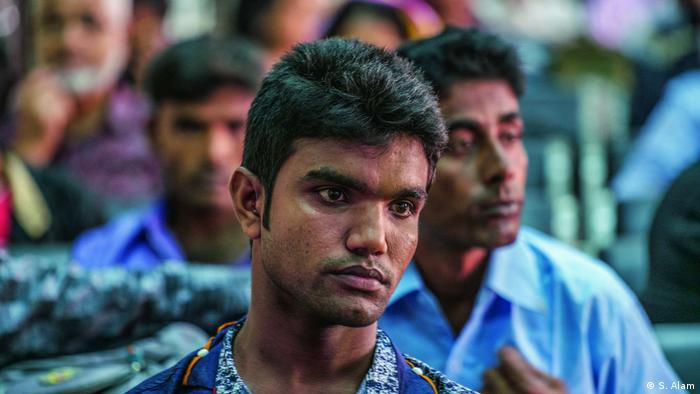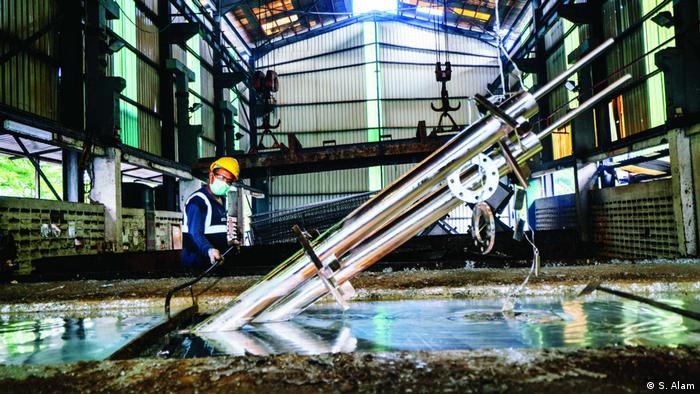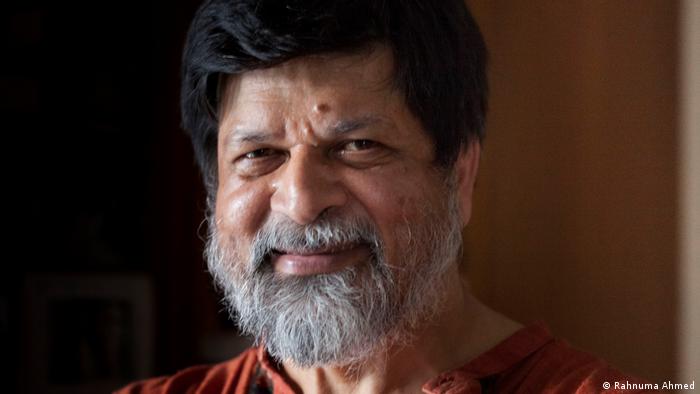An unusual view on the subject of labour migration, an exhibition in Berlin sheds. Shahidul Alam from Bangladesh shows with his photographs, how different life paths can be.

People behind bars. Children, women, only few men. They are a little bit brighter dressed than we are. Most of the face look tired and sad – even the little Boy at the very front, holding it with both hands at one of the bars.
Flowers for the home-comers
From this photo, of very different situations: there Are people in jail or inmates of a refugee camp? But then one discovers in the second row, a radiant woman, next to her a huge bouquet of flowers. A tiny line at the top of the picture brings the solution: “Waiting for the loved one,” it says. There are families that are waiting at Dhaka airport to return home at the end of nationals. Husbands, fathers, mothers, the return as migrant workers for a short holiday to Bangladesh.

Where is she, the lost youth? A labour migrant from Bangladesh.
The Bengali Blogger and photographer Shahidul Alam told in the exhibition “The best years of my life” of migrant workers from Bangladesh who live in Malaysia and work. With his camera, he has accompanied you for one year. Alam has a precise eye for his protagonists. There is Sahanaz, the pensive look on your Smartphone – one of the few women among the labour migrants, says Alam. “She said: ‘I left my son when was a year. He stayed with my sister. Now he is 11. He calls my sister mom. And he calls me aunt.’” One can only imagine how high the price is, this young mother has to pay to feed their family.
Each year around 500,000 Bangladeshis to their homeland, to earn money far away from home. Long ago, the local economy is dependent on their Remittances. The Shahidul Alam know. In his home he is a well-known and feared activist. However, in the Berlin exhibition, he complains, but holds just very different ways of life. Because of the three-year-old son is huddled together on his bed; he has never seen his father. Also dependencies and broken promises in photographs of poor dwellings, or construction sites (see article image) deals with promise, the so-called employment agencies. Although the government could revoke the licences, it does nothing, reports Alam.

Successful: Today, Shaheen Sardar General Manager in his company
But he tells in his photos also take place and of human appreciation. As you can see Now, came as a penniless man to Malaysia and now a successful entrepreneur. Together with his wife he sits in a luxurious living room. Or Bashirol, together with his boss, the owner of a metal operation, solved. The men keep each other in the Arm, are obviously good things. Perhaps the strongest photo shows the portrait of a serious-looking man. To him a life of deprivation do nothing, we read on a blackboard. But in the end the pain is to him become aware that he has lost in his youth.
Migrants as people show

Shahidul Alam: The life of his human side show
To him it is going to show the lives of migrants “from his human side,” far away from all the clichéd typing, explains Alam. And he is thinking of us. Because Alams work, our “refugees are migrants”. Everyone likes to examine himself, exactly how he looks.
His next project is to turn on Shahidul Alam directly in a discussion in Germany. Similar to Dhakar he wants to exhibit here, too, in a mosque – in a few weeks ago, opened up a liberal mosque in the women’s rights activist Seyran Ates, the first mosque in which the women and men on an equal footing in a room to pray. Alam is aware of the fact that the liberal mosque is exposed to massive criticism and hostility. But he also knows from his homeland. Mosques should be open to the world, he says with a mischievous facial expression. This applies to Bangladesh as well as for Germany.
The exhibition “The best years of my life” was up to 30. June at the Federal foreign office in Berlin, made at the time of an international conference on Migration. Previously, she was seen at the Global Media Forum of Deutsche Welle in Bonn. It is planned to make in the future also schools. Parallel to the exhibition a book of that title by Shahidul appeared Alam.